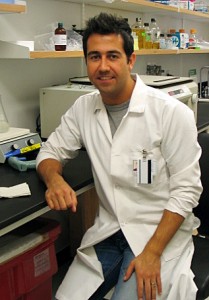William DePaolo ’99: Gut Instincts
Hundreds of trillions of bacteria make their home in the gut, outnumbering human cells in the body.

William DePaolo '99, assistant professor at the University of Southern California, has a five-year grant from the National Institutes of Health to nvestigate how infections that come into the intestine affect long-term health.
Generally, these microbes go about their business quietly — digesting food, absorbing nutrients, and helping immune cells recognize invaders. But everyday factors such as stress, illness, or even a chance encounter with a normally benign food or substance can perturb the system, causing detrimental health effects.
William DePaolo ’99 knows about such encounters. He recently directed a study showing how vitamin A can cause changes in intestinal bacteria, triggering an inflammatory response to gluten in those who are genetically susceptible. Previously, vitamin A was thought to help suppress inflammation in the intestine.
DePaolo’s interest in the regulatory mechanisms of the gut was, itself, sparked by chance encounters.
At Bates, his passion for science led him to apply for a Bates-sponsored Ladd Internship at Memorial Sloan-Kettering Cancer Center in New York. There, he studied solid tumor immunology under cancer doctor Howard Scher ’72, becoming mesmerized by bacteria’s sway over the human body.
He went on to study mucosal biology at Northwestern University Medical School, where, in the aftermath of Sept. 11, he joined other U.S. researchers in investigating countermeasures and vaccines for potential biological weapons.
“There has to be an environmental trigger.”
Doctorate in hand, DePaolo headed to the University of Chicago (where he sponsored his own Ladd intern) to study Yersinia pestis, the agent of bubonic plague. There, “in full garb and a protective suit” he helped direct studies showing how Y. pestis alters the immune system to make the plague so deadly. The findings made front-page news and were published in the journal Science.
His interest in the complexities of bacteria-host relationships fully piqued, DePaolo then looked at how such relationships contribute to inflammatory bowel disease.
Celiac disease, for example, is triggered by the ingestion of gluten, the protein found in wheat, barley, and rye. Yet only a small percentage of susceptible people get the disease. “That means there has to be an environmental trigger,” DePaolo says. Studies offered a clue: Celiac sufferers carry high amounts of an immune protein called interleukin-15 in their gut.
DePaolo’s team genetically engineered a mouse to express high levels of IL-15. When the scientists fed gluten to these mice, they developed intestinal inflammation and antibodies against gluten, just as celiac patients do. When vitamin A was added to the mix, the symptoms got worse.
These latest findings, published in the prestigious journal Nature, could lead to new treatments for celiac disease. Already, researchers are testing ways to neutralize IL-15 in those susceptible to the disease.
“These microbes contribute so much to our health and day-to-day living,” he says. “If you’re someone with a genetic susceptibility, the pathogens you encounter in life are important in determining how healthy you may be.”